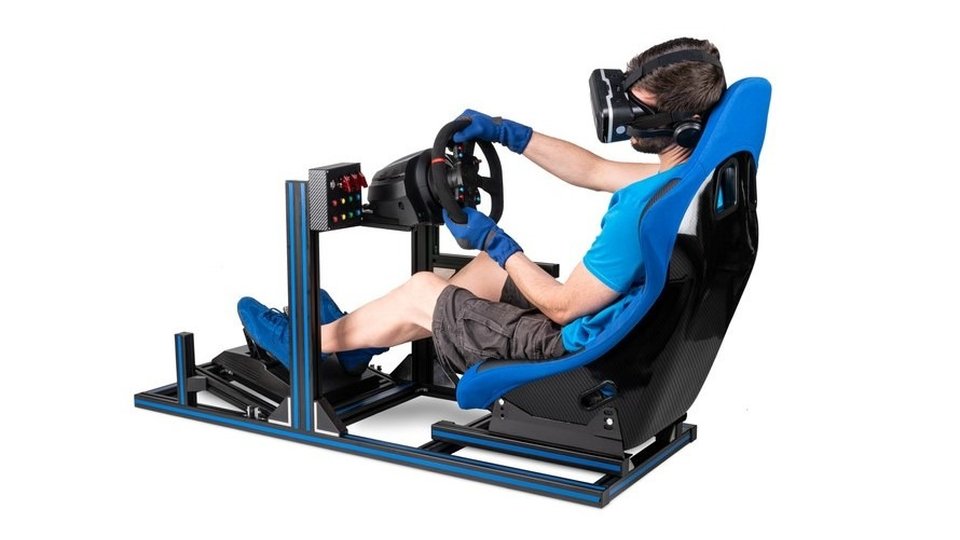Commentary
‘Simrace’ innovation catches fire worldwide
Tournament racing and e-sports are cashing in on racing simulation innovation, a global movement.

January 23, 2023 by Kevin Williams
Racing simulators, long popular in the amusement industry, are drawing a lot of attention of late, due to the expansion of e-sports as well as the growth of the tournament racing scene.
Developing high-end race simulator cockpits as well as creating opportunities for the commercial entertainment scene is proving a major component for companies worldwide.
Following is a summary of some of the more recent innovative "simrace" developments.
The race begins
Brogent Technologies Inc., based in Taiwan, known for its simulator attractions, has embraced the simulator racing scene with its F1 simulator based on its "mRide" motion base with a full race car monocoque.
The system also uses a mini-LED dome display, filling the racer's full vision and offering a compelling experience. The system, in partnership with Hockenheim-Ring GmbH, will be installed in a special race center at the new Welcome Center at Hockenheimring circuit near the town of Hockenheim in Baden-Württemberg, Germany this year.
Brogent Technologies has also been involved in a number of e-sports-based competitions, using its motion simulator platforms, and the company is looking to roll out an interactive racing attraction based on this technology.
Another deployment of the motion ride system is with a two-seater VR jetfighter experience, with riders taking flight in a carrier-based jetfighter mission. The passive experience offers a virtual simulation of air combat using the HTC Focus 3 — which is very timely with the popularity of the motion picture, "TopGun: Maverick."
Global action emerges
Moving across the globe, ImSim Simulation based in Portugal has introduced its compact racing seat system with its 3DoF motion capability.
Wave Italy, based in Italy, has introduced its "Simulator Pro" monocoque recreation of an F1 car, and its "Ghepard Maranello" simracing GT station incorporating a new motion system. The platform can represent different vehicles and offers a detailed simulation tuned to the players' needs, while the external design of the system offers stylish lines.
Amega Entertainment, based in Istanbul, Turkey, has introduced a pair of its simracing seats, employing full racing controls and a curved screen, with the units built for network competition. Part of its Formula S range of simulators, the systems are incorporated also in the portable "E-Racing Container" that offers the ability to deploy an e-sports experience to any location in a modular form.
Tecnoplay, based in Italy, has introduced a "Race Craft Evo" platform, offering up to eight player competition and three different levels of driving skill. The system combines a cost effective simrace setup, supporting a new tournament element developed by Belgium based Sandbox Games.
The SimGear, a Schaumburg, Illinois based maker of full motion simulators, has introduced its 2DoF motion simracing platforms incorporating a three-screen layout, offering a selection of the latest e-sports racing game competitions, ranging from project cars to "iRacing," subscription based online racing simulation video games.
Race Car Simulators, a well-known name in the development of entertainment racing simulators, has introduced a NASCAR racer, with accurate force feedback steering and motion that features the ability to be a turnkey solution for family entertainment centers, using smart apps for players to jump into the game.
Base Performance Simulators, based in the U.K., recently installed its "Phoenix" simracing platform as an attraction at Andretti Motorsports in Orlando, Florida. The system uses the D-Box Technologies G5 haptic technology to create the needed seat motion and haptic feedback.
Speaking of D-Box, the Quebec, Canada based company announced a partnership with Austin, Texas based Trak Racer to bring D-Box's haptic feedback to Trak Racer's chassis. The value of the haptic components to be sold by D-Box via this agreement is estimated at approximately $1 million.
This was followed by the announcement of a partnership with France-based RSeat to develop the first high-fidelity, multipurpose haptic platform. This plug-and-play, low-profile platform will be compatible with all RSeat simracing rigs, and almost all chassis from other simracing equipment manufacturers.
When connected to a PC and retrofitted under static seats such as sofas and recliners, it will be compatible with the D-Box ecosystem, allowing users to benefit from a haptic experience for the more than 2,500 films and television series available through the "D Box Plus" catalogue.
Competitive socializing enters the fray
The importance of simracing in the entertainment scene is not only regarding racing attractions or e-sports. The F1 Arcade competitive socializing venue comprises 60 simulators using the Vesaro platform supported by D-Box's latest G5 haptic technology.
The F1 Arcade operation went on to announce that London would soon be joined by a 11,000-square-foot venue at Paradise Birmingham.
One setback
On a somber note, the simrace scene for location-based entertainment center operators was rocked with the news that one of the popular racing games for the scene will end.
"Project Cars Pro," developed by London based Slightly Mad Studios, was the business-to-business version of a popular consumer racer series for location-based entertainment deployment. The game was developed to support location based entertainment arena businesses, and could support RaceRigs, VR and commercial operation, launched in 2019. This was the same year that Codemasters, the U.K. based game developer, acquired the studio, and from that mega publisher EA acquired them for $1.2 billion, completed in 2021. And with that completion, EA announced it would be stopping further investment in the "Project Cars" series, including the Pro platform, with the team moved to other projects where possible.
This move has already seen operators of the game in location based entertainment seeing the content fail to launch or connect online — and starting a scramble to find an alternative game solution.
The real racing factor
Regarding real racing and karting, the continued inclusion of gamification to the racing experience continues, with France based Sodikart presenting its "Game of Karts." The company, a manufacturer and developer in the karting industry, has turned its expertise to adding an interactive element, releasing what is called "the ultimate karting experience."
The system incorporates, along with projected icons along the course, a steering wheel touchscreen used to inform the player of their score and to see if they have collected items such as bombs, missiles, boosts and shields which they can use against fellow racers.
In addition, RiMo Germany GmbH, known for its karting developments, introduced its "Battle Karts" platform. The projection-based AR experience sees the players' vehicles tracked, with the use of special projected courses and game experiences. The concept has already been installed in several European venues and is looking to expand its reach.
Racing has clearly gripped the amusement industry's imagination on more than one level.
(Editor's note: Extracts from this blog are from recent coverage in The Stinger Report, published by Spider Entertainment and its director, Kevin Williams, the leading interactive out-of-home entertainment news service covering the immersive frontier and beyond.)
About Kevin Williams
Along with advisory positions with other entrants into the market he is founder and publisher of the Stinger Report, “a-must-read” e-zine for those working or investing in the amusement, attractions and entertainment industry. He is a prolific writer and provides regular news columns for main trade publications. He also travels the globe as a keynote speaker, moderator and panelist at numerous industry conferences and events. Author of “The Out-of-Home Immersive Entertainment Frontier: Expanding Interactive Boundaries in Leisure Facilities,” the only book on this aspect of the market, with the second edition scheduled for a 2023 release.
 ChatGPT
ChatGPT Grok
Grok Perplexity
Perplexity Claude
Claude






